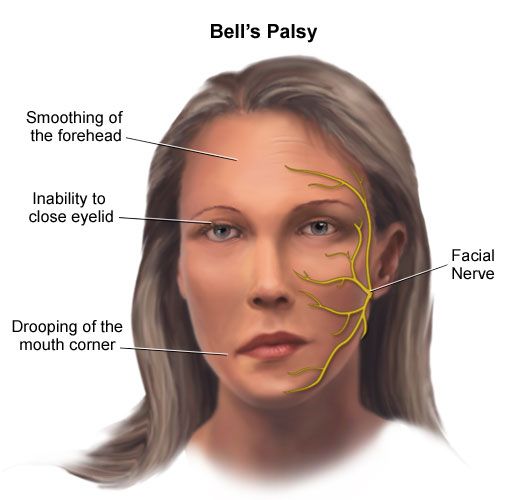Common symptoms of Bell’s Palsy include:
1. Facial Weakness or Paralysis: Bell’s Palsy typically causes sudden weakness or paralysis of the facial muscles on one side of the face. This can result in a drooping appearance of the mouth and difficulty in making facial expressions on the affected side.
2. Drooping of the Mouth and Eyelid: One of the hallmark signs of Bell’s Palsy is the drooping of the corner of the mouth and the lower eyelid on the affected side.
3. Difficulty Closing the Eye: Many individuals with Bell’s Palsy find it challenging to fully close their eye on the affected side. This can lead to dryness and potential corneal damage, as the eye may not blink properly to distribute tears.
4. Altered Sense of Taste: Some people with Bell’s Palsy may experience changes in their sense of taste, often described as a metallic or salty taste.
5. Drooling: Due to the difficulty in controlling the muscles on the affected side of the face, some individuals may experience drooling.
6. Increased Sensitivity to Sounds: A heightened sensitivity to sounds, known as hyperacusis, can occur in some cases of Bell’s Palsy.
7. Loss of Facial Symmetry: Bell’s Palsy can result in a lack of symmetry between the two sides of the face, with the unaffected side appearing normal while the affected side shows weakness or paralysis.
8. Difficulty Speaking and Eating: Speech and eating can be affected due to the weakness of the facial muscles involved in these activities.
It’s important to note that Bell’s Palsy usually affects only one side of the face, and the onset of these symptoms is typically rapid, often occurring within a day or two. While the exact cause of Bell’s Palsy is not always clear, it is often related to inflammation or compression of the facial nerve, which controls the muscles of the face.
Most cases of Bell’s Palsy are temporary, and the majority of individuals experience significant improvement in their symptoms with time and appropriate treatment. However, it’s essential to consult a healthcare provider for a proper diagnosis and guidance on managing Bell’s Palsy.
If you’re unsure whether physiotherapy is suitable for your specific condition, consult a qualified physiotherapist Dr. Kishan Mishra, one of the best Physiotherapist in Borivali at Sanjeevani physiotherapy for an assessment and personalized treatment plan.




